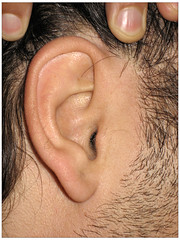Strange little back-story (on the front page). Federal earmarks are more complicated than assumed. For instance, the Colorado Dept of Transportation was forced to build an overpass for elk, coyote and other wildlife, against their will. The CDT would rather spend the money building new roads for SUVs, or filling potholes or something.
As Earmarked Funding Swells, Some Recipients Don't Want It - WSJ.com ...the reaction at the Colorado Department of Transportation, the direct recipient of the federal money, was far different. “Earmarks make my life miserable,” says Tom Norton, the agency's head. And in fact, many federal and state officials whose agencies receive earmarked money say they don't want it.The problem, they say, is that most earmarks don't come with extra money from Washington. They merely dictate how agencies must spend federal money they were already counting on. Mr. Norton says the wildlife bridge is a waste of money that could divert federal funds from more pressing highway projects. His department never agreed to fund it. Earmarks, he complains, force him to use limited federal money to pay for lawmakers' pet projects.
Earmarks do seem to have run wild, a true bi-partisan spend-fest. Perhaps voters in the districts ought to have more input? Probably would be chaos, but Congress seems pretty eager to spend money it doesn't have. There is more than a whiff of corruption about the whole process.
Traditionally, annual funding bills passed by Congress set broad spending priorities, but left it to the executive branch and to states to decide how to meet those goals. When earmarks were tacked onto those bills, they came primarily from committee chairmen or veteran lawmakers with clout.Earmarks allow lawmakers to fund projects fast, with little public scrutiny. These days, their use is mushrooming. Congressional leaders are using them to help vulnerable junior colleagues curry favor with home-state constituents to boost re-election efforts. Earmarks grease the skids for important legislation -- bills loaded with spending provisions that benefit numerous congressional districts tend to garner more votes. In recent years, Republican leaders have offered lessons for newly elected lawmakers in how to get earmarks.
In the 1980s, President Reagan vetoed a transportation authorization bill because it contained a few hundred earmarks. Last year's version included more than 6,000, including $223 million for a bridge to a sparsely populated Alaskan island -- the oft-mocked “Bridge to Nowhere.” In the fiscal year ended Sept. 30, 2005, there were 15,818 earmarks in all federal spending bills, up from about 3,034 in fiscal 1996, according to the research arm of Congress, the Congressional Research Service.
...Leaders in both parties use earmarks to reward lawmakers. For example, Pennsylvania Democratic Rep. John Murtha, who will be chairman of the defense spending panel, won't allow members to add earmarks to the defense-spending bill unless they agree to support it, according to aides on the appropriations committee. This year's defense bill, which included nearly 3,000 earmarks, took a mere 20 minutes to pass the House in October.
...
Earmarks made up about $40.8 billion, or 4%, of the roughly $1 trillion that Congress allocated in the 2005 fiscal year. Federal prosecutors in Washington, Los Angeles and San Diego are looking into potential abuses, including whether lawmakers have added earmarks to benefit political contributors, former staffers and friendly lobbyists. At least four congressmen, including Rep. Jerry Lewis, the current chairman of the House Appropriations Committee, are being investigated for their roles in earmarking or their ties to lobbyists specializing in earmarks.Some congressmen have called for abolishing earmarks altogether, but there is widespread doubt that major change will occur. Rep. Alan Mollohan, a West Virginia Democrat, is under federal investigation for steering hundreds of millions of dollars in earmarks to nonprofit groups run by friends, former staffers and business partners. He will take charge of the appropriations subcommittee that oversees law-enforcement agencies. Mr. Murtha, who opposes changes to the system, will take over the powerful defense appropriations subcommittee.

